entire issue [pdf 2.79 mb] - Pitt Med - University of Pittsburgh
entire issue [pdf 2.79 mb] - Pitt Med - University of Pittsburgh
entire issue [pdf 2.79 mb] - Pitt Med - University of Pittsburgh
Create successful ePaper yourself
Turn your PDF publications into a flip-book with our unique Google optimized e-Paper software.
Dentistry—wrote theaccompanying editorial.Legro is a pr<strong>of</strong>essor <strong>of</strong>obstetrics and gynecologyat Pennsylvania State<strong>University</strong> in Hershey, Pa.Levi Downs (MD’94), assistant pr<strong>of</strong>essor<strong>of</strong> obstetrics, gynecology,and women’s healthat the <strong>University</strong> <strong>of</strong>Sherwood grabs his jump kit and disappears down the mountain. Minnesota, is glad thereis now a vaccine to preventwomen from contracting human papilloma-accept elk steaks or other services as payment.Anita Courcoulas (General Surgery Intern ’89, virus (HPV), which causes most cervical cancers.Surgery Resident ’95, Pediatric Surgery Fellow ’96, But he notes the vaccine won’t help womenMinimally Invasive Surgery Fellow ’00) leads <strong>Pitt</strong>’s who already have the virus and are susceptibleDivision <strong>of</strong> Minimally Invasive Bariatric and General to cervical cancer. He is investigating ways toSurgery. Courcoulas studies the outcomes <strong>of</strong> bariatric shut down the proteins in HPV that cause thesurgery through several National Institutes <strong>of</strong> Health growth <strong>of</strong> new blood vessels that feed tumors.grants. Because <strong>of</strong> several common side effects— He experiments with RNA interference to stopincluding nausea, dehydration, mood change, hair loss, the mechanism.and excess skin—she says it’s important that researcherscontinue to delve into these areas. She serves as pr<strong>of</strong>essor <strong>of</strong> surgery at Washington <strong>University</strong>Doug Schuerer (MD ’95), an assistantprincipal investigator on a longitudinal study <strong>of</strong> bariatricsurgery in children. The methodology paper on the problems that trauma surgeons see there, suchin St. Louis, researches a nu<strong>mb</strong>er <strong>of</strong> commonstudy came out in April.as ATV and hunting accidents and blood infections.He has been named medical director <strong>of</strong>During his residency at Magee-Womens Hospital<strong>of</strong> UPMC, Richard Legro was inspired by David Guzick, trauma at Barnes–Jewish Hospital and says heMagee’s director <strong>of</strong> the Division <strong>of</strong> Reproductive enjoys trauma surgery because it allows himEndocrinology at the time, who shared his loveto operate on the whole body. In January, he<strong>of</strong> medical research. When Legro (Obstetrics and advocated for a Missouri bill proposing fines forGynecology Resident ’91) published a paper in The drivers who don’t wear seat belts. He and hisNew England Journal <strong>of</strong> <strong>Med</strong>icine this year examining wife, Nickie Kolovos (MD ’96)—spotlighted inthe common treatments for polycystic ovary syndrome our Fall 2006 “The Way We Are”— expect their(PCOS), he was pleased to see that Guzick—now dean first child in July.<strong>of</strong> the <strong>University</strong> <strong>of</strong> Rochester School <strong>of</strong> <strong>Med</strong>icine and—Meghan Holohan & Chuck Staresinicall over the world, including typhoid, trypanosomiasis,schistosomiasis, malaria, dengue fever, visceral leishmaniasis,and Japanese encephalitis, to name a slew.Playtime was also an adventure.“I was lucky enough to be able to visit many <strong>of</strong> theA Brahman <strong>of</strong>fers blessings toSpringer (in blue) before the doctor remote parts <strong>of</strong> Nepal, kayak its rivers, and spend timekayaks down the Kali River along the with well-known me<strong>mb</strong>ers <strong>of</strong> the cli<strong>mb</strong>ing and adventuringcommunity,” he writes.western border <strong>of</strong> Nepal.Today, Springer is chair <strong>of</strong> the emergency departmentin a rapidly growing private-venture hospital in Beijing. His outdoor pursuits nowtake him to remote Mongolia, where, “Instead <strong>of</strong> Nepali tea and coconut biscuit, it isalcoholic fermented mare’s milk and dried, rock-hard cheese.”Where will Springer be in a few years’ time? Good question. He is looking forwardto the 2008 Summer Olympics in Beijing. But his son plans to begin college this yearin Colorado. Better note Springer’s location in pencil, not ink.—Chuck Staresinic & Katie HammerTHE WAY WE ARECLASS OF ’97Sherri-Ann Burnett Bowie (MD ’97) isan instructor <strong>of</strong> medicine in Harvard <strong>Med</strong>icalSchool. During her work on her MPH atHarvard, which she earned in 2005, Burnett Bowienoticed that <strong>of</strong>ten people with vitamin D deficienciescouldn’t process insulin as well as other people. Soshe is pursuing a study that will explore the connectionbetween the two disorders. In 2005, she won theMassachusetts General Hospital Physician-ScientistAward and in 2006 she was a Chester Pierce ResearchSociety Speaker at the hospital. Burnett Bowie says theproblem-based learning sessions in medical school weregreat preparation for her work in endocrinology.<strong>Pitt</strong> also prepared Devin Brown (MD ’97) forher career at the <strong>University</strong> <strong>of</strong> Michigan as a physicianscientist.As medical students, Brown and classmateTeresa Smith (née Jacobs, MD ’97) investigatedthe prevalence <strong>of</strong> primitive reflexes in healthy youngadults to aid clinical evaluations <strong>of</strong> neurological disease.These infantile reflexes do not typically persistinto adulthood, unlike, say, the sneeze reflex. Butthey are common in patients with frontal lobe lesions,schizophrenia, and Alzheimer’s disease. In 1998, theduo published their paper in Neurology with the help<strong>of</strong> former <strong>Pitt</strong> neurologist Laurie Knepper (MD ’85).Today as an assistant pr<strong>of</strong>essor <strong>of</strong> neurology, Brownstudies sleep apnea in stroke patients.As the training director <strong>of</strong> the Office <strong>of</strong> CriticalEvent Preparedness and Response and assistant pr<strong>of</strong>essor<strong>of</strong> emergency medicine at Johns Hopkins<strong>University</strong>, Ed Hsu (MD ’97) travels throughout theworld evaluating medicine and public health problemsin disaster-prone areas.Hsu has worked with physicians and healthcarepr<strong>of</strong>essionals in many nations, training doctors tohandle medical situations following emergencies.One month after classmate Brian Klatt (MD’97) completed his tour as an attending orthopaedicsurgeon in the U.S. Air Force, he visited Nepal andmet some <strong>of</strong> Hsu’s colleagues who were helping theNepalese plan for emergency care during earthquakes.Klatt served for five months in a field hospital at CampAnaconda in Balad, Iraq, north <strong>of</strong> Baghdad, wherehe stabilized U.S. soldiers for transport to Germanyand performed surgeries for Iraqis. During that time,though there were only three orthopaedists at thecamp, more than half <strong>of</strong> the 1,200 surgeries the doctorsperformed were orthopaedic.Klatt now works as a fellow in adult reconstructionat Thomas Jefferson <strong>University</strong> in Philadelphia. Whenwe spoke with him, he was organizing his class’s eventsfor <strong>Med</strong>ical Alumni Weekend. —MHSUMMER 2007 37


![entire issue [pdf 2.79 mb] - Pitt Med - University of Pittsburgh](https://img.yumpu.com/50435398/39/500x640/entire-issue-pdf-279-mb-pitt-med-university-of-pittsburgh.jpg)
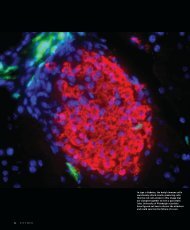
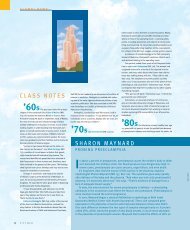
![entire issue [pdf 6.47 mb] - Pitt Med - University of Pittsburgh](https://img.yumpu.com/50360689/1/190x231/entire-issue-pdf-647-mb-pitt-med-university-of-pittsburgh.jpg?quality=85)
![entire issue [pdf 12.7 mb] - Pitt Med - University of Pittsburgh](https://img.yumpu.com/49831615/1/190x231/entire-issue-pdf-127-mb-pitt-med-university-of-pittsburgh.jpg?quality=85)
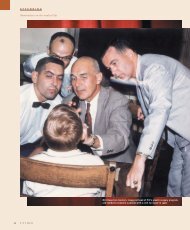
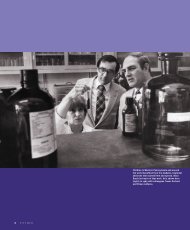
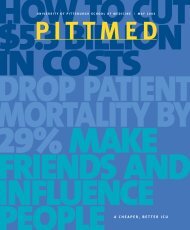
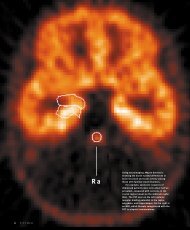
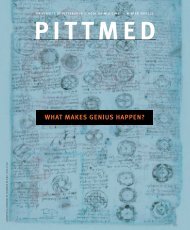


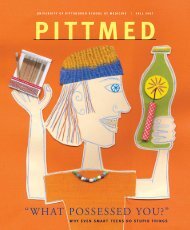
![entire issue [pdf 11.3 mb] - Pitt Med - University of Pittsburgh](https://img.yumpu.com/46685830/1/190x231/entire-issue-pdf-113-mb-pitt-med-university-of-pittsburgh.jpg?quality=85)
![entire issue [pdf 12.7 mb] - Pitt Med - University of Pittsburgh](https://img.yumpu.com/44997419/1/190x231/entire-issue-pdf-127-mb-pitt-med-university-of-pittsburgh.jpg?quality=85)